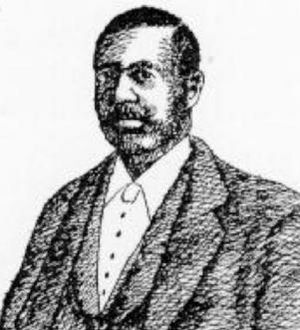John W. Wheeler facts for kids
John W. Wheeler (born around 1847, died after 1907) was an important newspaper editor. He led the St. Louis Palladium, a newspaper for black communities in St. Louis, Missouri. He worked there from about 1884 until it stopped publishing around 1911.
About John W. Wheeler
John W. Wheeler was born free in Kentucky. In 1860, when he was 14, he lived with his parents, George M. and Mary M. Wheeler, in Freedom Township, Missouri.
During the American Civil War, Wheeler worked as a servant for the Union Army. After the war, he lived briefly in Indianapolis before moving to St. Louis in 1867. He was 20 years old then. He started working as a clerk in a tobacco warehouse and later became a foreman. He even started his own business as a tobacco contractor, hiring up to 30 people.
Wheeler married Hattie Hahn from Indianapolis on December 24, 1869. In 1900, he was living on Chestnut Street in St. Louis.
In February 1907, Wheeler had an accident. He was trying to get on a streetcar in St. Louis when his foot broke. He wrote in his newspaper about what happened:
The streetcar seemed like it would stop, so I tried to get on. But just as I had one foot on the step, the driver sped up. This made me slip and fall, putting all my weight on my right foot. I was dragged about twenty feet.
The streetcar did not stop. A passer-by helped Wheeler get home. He needed to rest for a while, and Olivia Richardson managed his newspaper during that time.
Wheeler's Career and Beliefs
In 1893, Wheeler became a part-time Methodist minister. He sometimes led services at St. Paul's Methodist Church and other churches in St. Louis. He stopped being a minister when he took over the Palladium around 1897. But he still called himself "the Political Preacher." He also liked to be known as the "Palladium Man."
Wheeler believed strongly in people working together. He once wrote:
We have always had the utmost confidence in the brotherhood of mankind, and when the humanity of man is touched, he will turn to the right.
He was a Republican and accepted jobs given to him by Republican politicians. Wheeler was involved in almost every important event for African Americans in St. Louis. He held views similar to Booker T. Washington. This meant he believed black people should stick together, support black-owned businesses, improve their communities, and work with white allies. He thought that causing too much trouble might make things worse.
Wheeler was active in many movements that helped black people in St. Louis from the 1870s to the early 1900s. He was known for writing articles that promoted himself and for having public debates with other leaders. His newspaper was the official voice for two groups: the United Brothers of Friendship and the Sisters of the Mysterious Ten.
Wheeler spoke out against a suggestion that black people should move to the Philippine Islands. He wrote in the Palladium: "If black Americans are smart, they will stay where they were born. If they say they can't handle the unfairness here, what will happen if they move to a new country where life is a struggle?"
He also fought against laws that separated people by race. In 1903, he joined other African Americans in the state capital. They successfully worked to stop a proposed law that would have created separate railroad cars for black people across the state.
Wheeler was also an alternate delegate at the 1900 Republican National Convention.
The St. Louis Palladium Newspaper
The Palladium was a powerful tool for John W. Wheeler. He used it to share ideas, give advice, and help black people gain power and improve their lives. He also aimed to change how white people saw the black community.
In August 1904, another newspaper, the Sedalia Weekly Conservator, called Wheeler a "courageous editor."
The Palladium stopped being published around 1911.
Another newspaper, The Professional World, sometimes criticized Wheeler and his paper. An editorial in the World said the Palladium "had no regard for the truth." It also disagreed with Wheeler calling another editor an "old black man." The World wrote that such comments were "disgraceful" and that the Palladium rarely had proper editorials because it lacked "intelligence."


